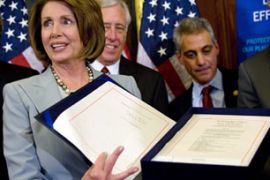US adopts $700bn bailout plan
President Bush signs bailout into law after being passed by the House of Representatives.

The House had sparked market and political turmoil by rejecting an earlier version of the bailout on Monday by 228 votes to 205.
Bipartisan effort
But on Friday, Bush hailed the bipartisan effort to get the bill passed despite concerns over handing that much power to one man and the idea of using taxpayer money to bail out Wall Street firms.
| Bailout plan |
|
The US treasury will borrow $700bn from the international money markets by selling bonds to foreign countries. The treasury will then use the money to buy back mortgage backed-securities from US banks and institutions. |
“By coming together on this legislation, we have acted boldly to help prevent the crisis on Wall Street from becoming a crisis in communities across our country,” he said.
Congressional leaders had been optimistic the bill would be approved after several senior politicians said they would drop their opposition to it. The bill had been amended by the senate to attract more Republican votes.
John Boehner, a senior Republican in the House, said that the version of the bailout passed by the House was superior to the original version requested by the Bush
administration.
“The passage of this flawed but necessary bill is not cause for celebration,” he said, adding that the congress had allowed sectors of the finance industry to “run amok”.
Democratic and Republican negotiators agreed on the terms of the amended bailout on Tuesday, which includes extended tax cuts for businesses.
In another new measure, the bill raises the limit on federal insurance for bank deposits from $100,000 to $250,000.
James Clyburn, the Democrat Majority whip in the senate, which passed the bill on Wednesday, said: “I am hopeful that we have gone a long ways towards restoring confidence in our markets.”
However, the passing of the bill failed to trigger gains on Wall Street. US stocks fell heavily as investors remained nervous about a global credit squeeze and weak economy.
The Dow Jones industrial average, which measures the stocks of leading US companies, fluctuated sharply, and ended the day down 157 points.
Al Jazeera’s John Terrett, reporting from the floor of the New York Stock Exchange, said that traders were angry at Nancy Pelosi, speaker of the House, who commented on the “party being over for Wall Street”.
“Traders were telling her to shut up and to get on with announcing the vote,” he reported.
“There seems to be a big schism in what goes on in the minds of Democratic politicans and those working in the cockpit of the world’s financial system here in Wall Street.”
‘Only the beginning’
The two rivals looking to succeed Bush in the White House urged caution after welcoming the legislation.
Barack Obama, the Democrat presidential candidate, urged the Bush administration and Paulson to use their authority in a way which “protects taxpayers”.
 |
| New York’s Dow Jones fell 157 points despite the passing of the bailout [AFP] |
“I want those plans on tap quick so that we start getting some relief to homeowners out in neighbourhoods,” he said. “Even if this rescue package works exactly as it should, it’s only the beginning, it’s not the end.”
John McCain, the Republican candidate, told reporters in Arizona the bailout was “an outrage” even if it was necessary.
“Further action is needed and it shouldn’t take a crisis to get this country to act and this congress to act in a bipartisan fashion,” the Arizona senator said.
Bill Spriggs, an economics professor at Howard University, told Al Jazeera that the bailout would restore trust between banks and get liquidity into the system.
“The folks on Wall Street scream louder, which is why their problems were attended to, but the American people don’t know how to scream, because they have been told throughout the Bush years that the market will clear all this, this is no a problem, but it has oviously manifested itself into a huge problem.”
The bailout was passed amid the news that the world’s largest economy shed about 159,000 jobs in September, as the weight of the housing collapse and credit crunch hit many industries.
The unemployment rate held at 6.1 per cent, a five-year high, with payrolls having fallen by 760,000 this year, the labour department said.